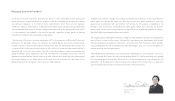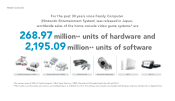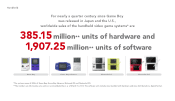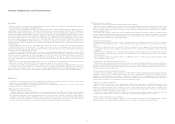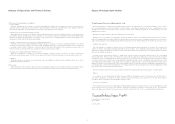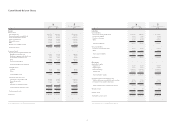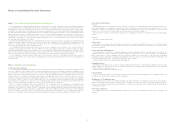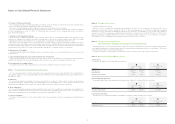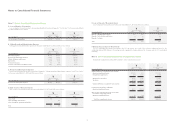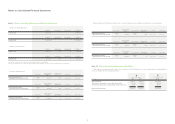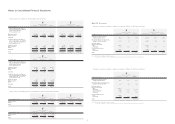Nintendo 2013 Annual Report Download - page 23
Download and view the complete annual report
Please find page 23 of the 2013 Nintendo annual report below. You can navigate through the pages in the report by either clicking on the pages listed below, or by using the keyword search tool below to find specific information within the annual report.
(3) Risks around legal regulations and litigation
•Product liability
Nintendo manufactures its products in accordance with applicable quality control standards in locations of sale. However,
large-scale product recalls may occur due mainly to defective products, which may cause Nintendo to incur additional expenses
and Nintendo’s reputation as well as Nintendo’s performance and financial position may suffer.
•Limitations of enforcing intellectual property rights
Although Nintendo continues to accumulate various intellectual properties to produce different products, counterfeit products
and unlawful software already have gone into circulation in some regions and (becomes available on the internet which) violate
Nintendo’s intellectual property rights. In the future, it may continue to be a challenging task to take full action against every
infringement of Nintendo’s intellectual property rights.
•Leakage or unauthorized access of personal or confidential information
Nintendo possesses personally identifiable information about its consumers, as well as confidential information concerning
development and business operations. If such personally identifiable information or confidential information were ever breached
or otherwise leaked outside of Nintendo, or accessed without Nintendo’s authorization, there would be an adverse effect on
Nintendo’s future operating performance, reputation, share price and financial condition.
•Changes in accounting standards and taxation systems
Unpredicted adoptions or changes in accounting standards or taxation systems could have an effect on Nintendo’s
performance and financial position. Conflict of views between Nintendo and the tax authorities may cause additional tax costs.
•Litigation
Nintendo’s operations in Japan and overseas may be subject to litigation, disputes and other legal procedures. These issues
may affect Nintendo’s performance.
(4) Other risks
Other than the risks set forth above, factors such as uncollectibility of trade accounts receivable and notes receivable, collapse
of financial institutions and environmental restrictions may adversely affect Nintendo’s performance and financial position.
We have audited the accompanying consolidated financial statements of Nintendo Co., Ltd. and its subsidiaries, which comprise
the consolidated balance sheets as at March 31, 2013, and the consolidated statements of income, comprehensive income,
changes in net assets and cash flows for the year then ended, and a summary of significant accounting policies and other
explanatory information.
Management’s Responsibility for the Consolidated Financial Statements
Management is responsible for the preparation and fair presentation of these consolidated financial statements in accordance
with accounting principles generally accepted in Japan, and for such internal control as management determines is necessary to
enable the preparation of consolidated financial statements that are free from material misstatement, whether due to fraud or error.
Auditor’s Responsibility
Our responsibility is to express an opinion on these consolidated financial statements based on our audit. We conducted our
audit in accordance with auditing standards generally accepted in Japan. Those standards require that we comply with ethical
requirements and plan and perform the audit to obtain reasonable assurance about whether the consolidated financial statements
are free from material misstatement.
An audit involves performing procedures to obtain audit evidence about the amounts and disclosures in the consolidated
financial statements. The procedures selected depend on the auditor’s judgments, including the assessment of the risks of material
misstatement of the consolidated financial statements, whether due to fraud or error. In making those risk assessments, the auditor
considers internal control relevant to the entity’s preparation and fair presentation of the consolidated financial statements in order
to design audit procedures that are appropriate in the circumstances, while the purpose of the financial statements audit is not to
express an opinion on the effectiveness of the entity’s internal control. An audit also includes evaluating the appropriateness of
accounting policies used and the reasonableness of accounting estimates made by management, as well as evaluating the overall
presentation of the consolidated financial statements.
We believe that the audit evidence we have obtained is sufficient and appropriate to provide a basis for our audit opinion.
Opinion
In our opinion, the consolidated financial statements present fairly, in all material respects, the financial position of Nintendo Co.,
Ltd. and its subsidiaries as at March 31, 2013, and their financial performance and cash flows for the year then ended in
accordance with accounting principles generally accepted in Japan.
Convenience translations
The U.S. dollar amounts in the accompanying consolidated financial statements with respect to the year ended March 31, 2013
are presented solely for convenience. Our audit also included the translation of Japanese yen amounts into U.S. dollar amounts
and, in our opinion, such translation has been made on the basis described in Note 1 to the consolidated financial statements.
PricewaterhouseCoopers Kyoto
Kyoto, Japan
June 26, 2013
To the Board of Directors of Nintendo Co., Ltd.
Analysis of Operations and Financial Review Report of Independent Auditor
23






